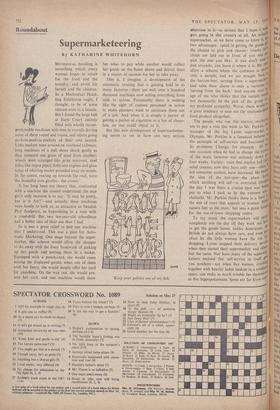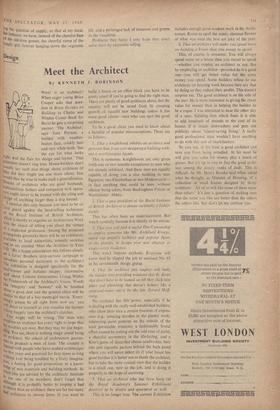Roundabout
Supermarketeering
By KATHARINE WHITEHORN
MECHANICAL handling is something which every woman hopes to attain for the food and the • laundry; and avoid for herself and the children. So a Mechanical Hand- ling Exhibition ought, I thought, to be of some interest even to a female. But I found the large hall at Earls Court entirely filled with wholly incom- prehensible machines with men in overalls driving some of them round and round, and others going pocketa-pocketa-pocketa of their own accord. Little buckets went around on overhead railways; long machines of a dull sheen shook gently as they screened one grain of sand from another; wheels were arranged like prize marrows, steel tubes like organ pipes; bolts and engines and glass tubes of whirling matter pounded away on stands. In the centre, rearing up towards the roof, were the beautiful iron giraffes: the cranes.
It has long been my theory that, confronted with a machine she cannot understand, the nice girl's only recourse is to say: 'It may be pretty, but is it Art?'—and actually these machines were lovely to look at, as attractive as Swedish Play Sculpture, as hypnotising as a man with a road-drill. But two ten-year-old schoolboys had a better idea of their use than I had.
So it was a great relief to find one machine that I understood. This was a plan for Auto- matic Marketing. One stage beyond the super- market, this scheme would allow the shopper to do away with the fussy handwork of picking up her goods and putting them in a basket. Equipped with a punch-card, she would roam among the displayed goods; when one of them took her fancy, she would simply offer her card for punching. On the way out, she would pre- sent her card, and one machine would show her what to pay while another would collect her goods on the floors above and deliver them in a matter of seconds for her to take away.
This is, I imagine, a development of the automatic vending that is gaining hold in so many factories—there are well over a hundred thousand machines now selling everything from milk to nylons. Presumably there is nothing like the sight of canteen personnel in action to make planners want to automate them out of a job. And when it is simply a matter of getting a packet of cigarettes or a bar of choco- late, no one could object to it.
But this new development of supermarketeer- ing seems to me to have one very serious 'Keep your politics out of my fish.'
THE SPECTATOR, MAY 13. 1061 objection to it—so serious that I hope it nev6 gets going in this country at all. An or( jog/ supermarket, as we have come to know it, two advantages: speed in getting the goods 31! the chance to pick and choose: twenty la° chops are laid out in front of you and pick the one you like: if you don't want 3 dud avocado, you leave it where it is. But nn:e allow a scheme where the customer is 01°'sil only a sample, and we are straight bact the barrow-boy; serving from a superintell3ft: ised sales floor above is only a variati n `serving from the back.' And anyone over thc. age of ten who thinks that the sample woelJ not necessarily be the pick of the grouP ha; my profound sympathy. Worse, there WOO !'1 &co a great tendency to ease out the unstanda food product altogether. The people who run this 'electric market°3 th° are to pay a visit this week to Mr. Purkiss, manager of the big Lyons supermarket Olympia. Mr. Purkiss is a fanatical believer the principle of self-service and fascinat bY its problems. Change, for example: 0. , one occasion when he had to change the laY°Ij' of the store, turnover was seriously dow fc'r four weeks. Variety: once that market had Out salad creams; now they have only one—so les, If not consumer content, have increased. He thl the idea of the hot-spot—the place Will which anything will sell—is overrated (th0411 the day I was there a crucial spot was bell4 put to what I took to be the extreme test: rhubarb). Mr. Purkiss thinks there is a lilrnit the size of store that appeals to women, , square feet at the most,' but sees a great utur` for the out-of-town shopping centre.
To my mind, the supermarkets will completely win the day till they work out to get the goods home; unlike Americans, 111 British do not always have cars, and eve fl often let the little woman have the car f'r shopping. Lyons stopped their delivery service when they started their supermarket, and olhcrs feel the same. Nor have many of the superovar' keteers realised that self-service in itself you nowhere—not when five women, crashl together with heavily laden baskets in a col fined space, can make as much trouble for themselves as five hippopotamuses. Some are far from snly' ing the question of supply, so that at my local, for instance, we have, instead of the cheerful face of the old-time grocer, the cheerful rump of the supply girl, forever hanging down the vegetable
lift, and a prolonged lack of tomatoes and greens in the meantime.
Problems they have; I only hope they don't solve them by electronic selling.





































 Previous page
Previous page